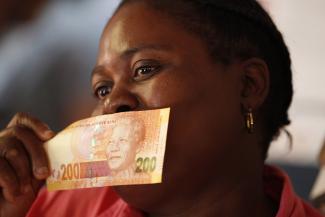Editorial
Specific business models

Public outrage is warranted. The global financial crisis, which started in 2007/08, is the result of market failure. Banks of solid reputation had wrapped dangerous risks in harmless looking products and sold them on to others. In the end, governments had to bail out private-sector banks the default of which would have brought down the entire world economy. Such interventions are expensive, so many nations concerned are now highly indebted.
The rich world has not escaped the crisis. Countries with their own currencies, such as the USA, Britain and Japan, are witnessing surprisingly low interest rates in spite of great sovereign debt. Nonetheless, their economies are not taking off. The reason is that companies hesitate to invest so long as they have idle production capacities and do not believe consumers are ready to spend on new products. At the same time, austerity means there is not much investment in urgently needed infrastructure either. Matters look even more difficult in the EU, because the European Monetary Union limits member governments’ scope for action.
So far, many developing countries and emerging markets have coped with the crisis quite well. Their domestic demand was strong because growing middle classes still have many unfulfilled consumer desires. The governments of rising powers, moreover, resorted to anti-cyclical policies, boosting growth. Demand from huge emerging markets, in turn, fuelled commodity-exporting economies. In the meantime, however, the economies of China, India and Brazil seem to be slowing down, and the outlook for poorer developing countries is deteriorating too. The rich nations, however, do not seem ready for a broad-based upturn.
Banks certainly do not deserve the kind of veneration some top managers took for granted before the crisis. Unless banks do their job of providing businesses with affordable capital for investment purposes, however, stagnation is all but guaranteed. A healthy financial sector is essential for economies to prosper.
For decades, financial systems around the world have been exposed to pressure towards global homogenisation. Such pressure is still evident. The US model may no longer be the unquestioned paradigm, but calls for global regulation have become louder. How this will play out remains to be seen. There are, however, some developmental lessons that are worth keeping in mind.
- Banks are somewhat insulated from global shocks if they rely on deposits from local clients rather than on refinancing from international capital markets.
- Local savings banks and cooperative banks tend to be more important drivers of economic development than commercial banks that have national or even international reach, so laws must give scope to their specific business models.
- Homogenisation results in herd behaviour which compounds risks.
- Government-run development banks have an important role to play, whether market-orthodox experts like the idea or not.








